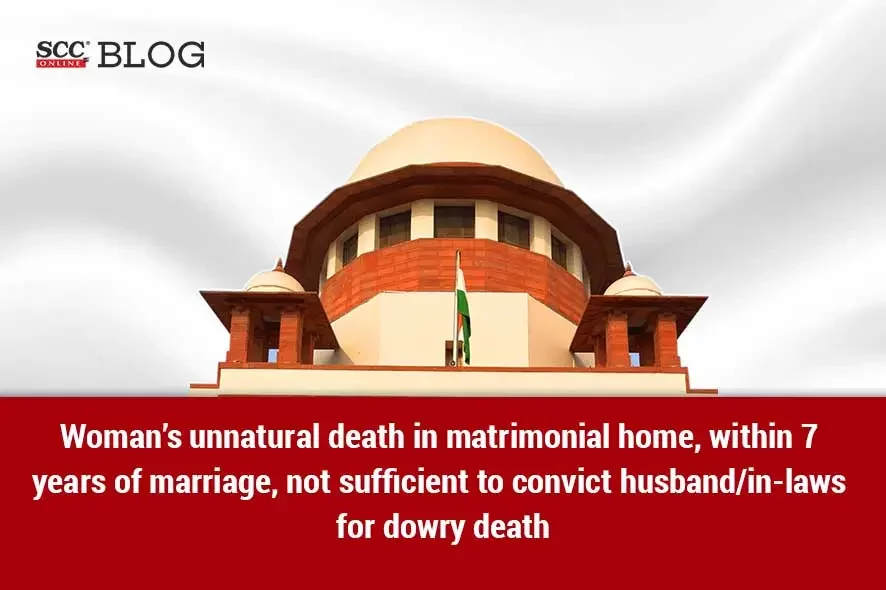Supreme Court: In a case dating back to 1995, wherein a woman died an unnatural death in her matrimonial home, the bench of Abhay S Oka and Rajesh Bindal*, JJ has held that mere death of the deceased being unnatural in the matrimonial home within seven years of marriage will not be sufficient to convict the accused under Section 304-B and 498-A IPC if the cruelty or harassment has not been proved to be soon before the death.
Background of the case
In the case at hand, the marriage of the appellant with the deceased was solemnised in 1993. Allegedly, two months after the wedding, the deceased came to her parental home and told her father that her in-laws are asking her to bring a motorcycle as the same was not given in dowry. Not in the position of giving motorcycle, the father pacified the deceased and sent her back. This, allegedly, happened every time the deceased visited her parental home and subsequently after about one year of marriage, the demand for land was also made.
The date of death of the deceased is 22.6.1995. She was cremated on the same day. The parents of the deceased had alleged that on 22.6.1995 in the morning at about 8.00 a.m., the deceased was beaten up and strangulated to death by her husband (the appellant herein), brother-in-law, and mother-in-law. They had cremated the dead body without even informing the complainant. The appellant, however, contended that the parents of the deceased were informed who were living about 290 kms. away. However, they could not reach on time. It was further submitted that the maternal grandmother and two maternal uncles who were living at a distance of about one furlong from the matrimonial residence of the deceased when she died were present at the time of cremation. They neither raised any issue nor did they inform the police.
Trial Court and High Court decisions
While the Trial Court had sentenced the appellant to undergo rigorous imprisonment for 10 years under Section 304-B, 2 years under Section 498-A and 2 years under Section 201 IPC. However, the High Court of Uttaranchal had reduced the sentence of the appellant under Section 304-B IPC from ten years to seven years. The conviction of the appellant is under Sections 304-B and 498-A IPC raising presumption regarding dowry death within seven years of marriage. The High Court had acquitted the brother-in-law and mother-in-law.
Supreme Court’s analysis
Observing that the cruelty or harassment has to be soon before the death, the Court noted that, in his evidence, the father stated that two months after the marriage his daughter came to the parental home stating that the appellant was demanding motorcycle, however, she was sent back and thereafter, she again came and apprised him besides motorcycle, land was also demanded. However, nothing in the statement showed any such demand was raised immediately before the death as the incidents sought to be referred to are quite old. He also admitted that at the time of funeral, his mother-in-law and two brothers-in-law were present, however, they were threatened not to lodge the complaint. Even the maternal grandmother and uncle did not share any details of cruelty or harassment, even they were living near the house of the deceased.
Hence, on a collective appreciation of the evidence led by the prosecution, the Court held that the prerequisites to raise presumption under Section 304-B IPC and Section 113-B of the Evidence Act were not fulfilled in the case at hand and hence, the conviction of the appellant cannot be justified.
[Charan Singh v. State of Uttarakhand, 2023 SCC OnLine SC 454, decided on 20-04-2023]
*Judgment Authored by Justice Rajesh Bindal
Know Thy Judge | Supreme Court of India: Justice Rajesh Bindal
Advocates who appeared in this case :
For Appellant(s) Mr. Shubhranshu Padhi, AOR (Amicus Curiae) Dr.(Mrs.) Vipin Gupta, AOR;
For Respondent(s) Mr. Jatinder Kumar Bhatia, AOR Mr. Krishnam Mishra, Adv. Mr. Param Kumar Mishra, Adv.







